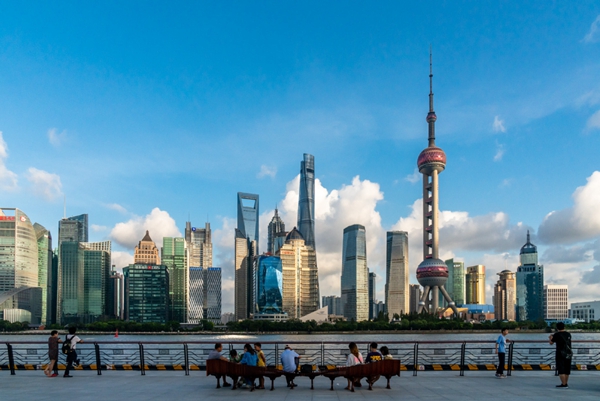China attracts foreign enterprises with institutional opening-up

Lujiazui, the financial center in Shanghai, forms a perfect backdrop to the Bund area. [Photo by Wang Gang/For China Daily]
Over the past five years, China has continued to expand its opening-up to the outside world, as well as deepened mutually beneficial and win-win international economic and trade cooperation, ranking among the top countries in terms of attracting foreign capital and foreign investment.
Since the beginning of this year, executives including Bob Sternfels, CEO of global consulting firm McKinsey& Co, François-Henri Pinault, chairman of Kering Group, and Guo Kongfeng, CEO of Wilmar International, have returned to Shanghai to guide their multinational companies' future development in China.
The latest Government Work Report, released during the two sessions, emphasized that greater efforts should be made to attract and utilize foreign capital, as well as to steadily expand institutional opening-up.
Deputies to the National People's Congress (NPC) said that they believe that China should adopt a more proactive opening-up strategy, boosting reform and development efforts with a higher level of opening-up.
Optimizing the business environment
Statistics from the Ministry of Commerce show that against the backdrop of increasing downward pressure on the global economy, China's actual use of foreign capital reached 1,232.68 billion yuan ($179.17 billion) in 2022, a year-on-year increase of 6.3 percent.
Deputies said this not only reflects the resilience, vitality, and potential of the Chinese economy and its attraction to the foreign capital, but also proves that opening-up is a major driving force to accelerate the country's economic and social development.
"Foreign capital and foreign trade still play a significant role in the current stage of economic development," said Quan Heng, an NPC deputy and Party secretary of the Shanghai Academy of Social Sciences. Quan said it is necessary to accelerate the construction of a unified, open, competitive, and orderly market system and business environment so that foreign trade will prosper and to attract foreign capital.
Jiang Ying, a member of the National Committee of the Chinese People's Political Consultative Conference and chairman of Deloitte China, said that building an institutional system according to relevant rules, regulations, management, and standards is a fundamental measure to promote high-level opening-up, as well as the basis for optimizing the business environment.
"This year's government work report has released a clear signal," said Lyu Hongbing, a member of the National Committee of the Chinese People's Political Consultative Conference and partner of Grandall Law Firm (Shanghai). "The next step is to turn the signal into concrete actions to attract more foreign companies."
China has played an indispensable role in global industrial and supply chains. It has also utilized the superimposed advantages of the Regional Comprehensive Economic Partnership agreement, as well as other international high-standard economic and trade agreements, such as the Comprehensive and Progressive Agreement for Trans-Pacific Partnership.
Jiang said the country should seize the opportunity to combine Chinese characteristics with high-standard international market rules.
The rule of law and internationalized market rules stimulates fair competition, as well as the development of domestic and foreign-funded enterprises. It can not only help better attract foreign investment, but also enhance the allocation of global resources and allow foreign investment to empower domestic enterprises more smoothly.
Tian Xuan, an NPC deputy and deputy dean of Tsinghua University's PBC School of Finance, said, "Through the continuous reinforcement of the interconnection mechanism of the stock market, the steady opening-up of the bond market, and the enrichment of the cross-border asset allocation tools, we are welcoming investments from the qualified overseas institutions in the China market. The flow of quality capital, talents, and technology can help domestic companies reduce financing costs and improve risk resistance and corporate governance."
Participating in formulation of international rules
China's economy has shifted from robust growth to the high-quality development path, while economic globalization is facing unprecedented headwinds.
The country needs to establish a restraint mechanism in comparison with relevant international rules, regulations, management, and standards in emerging fields amid the rise of new types of businesses, such as the digital economy and the modern service industry.
Wang Junshou, a member of the National Committee of the Chinese People's Political Consultative Conference and Party secretary of the Shanghai regulatory bureau of the China Banking and Insurance Regulatory Commission, said Shanghai should take the initiative to shoulder the responsibility of "a pilot zone" for the country, explore the establishment of a cross-provincial legislative coordination mechanism in the Yangtze River Delta region, as well as focus on optimizing the business environment and the integrated development of the Yangtze River Delta region.
"Relying on the Shanghai International Financial Center and Lin-gang New Area, we can explore and formulate tax policies to support the development of international financial centers," Wang added.
"We should not only refer to international rules and standards, but also participate in the formulation process to enhance our voice among international competition," Jiang noted.
Deputies said that China is able to expand its influence in global industrial and supply chains, fuel the allocation of global resources, as well as achieve a higher level of opening-up by playing an active part in setting up international rules.
Zhang Ying, a member of the National Committee of the Chinese People's Political Consultative Conference and deputy director of the Shanghai Municipal Commission of Economy and Informatization, said that taking the data industry as an example, China should help formulate standards for digital technologies, such as data flow, data security, certification evaluation, and digital currencies to deeply participate in the reshaping of global value chains and the new pattern of international distribution.
Jiang said entering the international market is the key to the formulation of international rules.
Encouraging enterprises to "go global" has become a top priority. Last year, China's foreign direct investment totaled 985.37 billion yuan, a year-on-year increase of 5.2 percent, ranking among the top in the world for many years in a row.
Lyu suggested that the country should speed up the formulation of the Foreign Investment Law of the People's Republic of China as the basic law of China's foreign investment and construct a legal system for foreign investment that is in line with the reality of reform and opening-up.
Supporting free trade zones
The China (Shanghai) Pilot Free Trade Zone, China's first free trade pilot zone, was established in 2013, taking on the fulcrum responsibility of leveraging China's further reform and opening-up. The negative list system explored by the free trade zone has led to major changes in the national foreign investment management system and promoted the introduction of the foreign investment law.
"After 10 years of development, the free trade zone needs to further promote institutional opening-up. We aim to provide China and developing countries a voice in the reconstruction of the world economic order, accelerate negotiations in key areas, and promote the construction of the open world economy," said Zhou Hanmin, a member of the National Committee of the Chinese People's Political Consultative Conference and president of the Shanghai Institute of Socialism.
Zhou suggested that the free trade zone should launch pilot projects covering issues like the transactions of data rights, privacy protection, and the flow of cross-border data.
"The Lin-gang New Area is building major functional platforms, such as the trading platform for international financial assets. We need more support from the central government in terms of cross-border foreign currency receipts and payments, remittances, and capital flows," said Yuan Guohua, an NPC deputy, Party secretary of Shanghai Lin-gang Economic Development (Group) Co Ltd, and deputy secretary of the Party Working Committee of the Lin-gang New Area of the Shanghai free trade zone.
Jin Penghui, an NPC deputy and vice-president of the Shanghai head office of the People's Bank of China, also suggested accelerating the exploration of financial services for offshore transactions.
"Starting with the headquarters economy, we can explore the establishment of an offshore fund management model in Pudong and realize the free and convenient entry and exit of foreign and inward funds."

 Print
Print Mail
Mail




